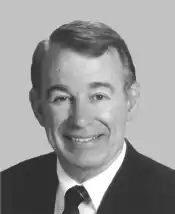| |||||||||||||||||
| |||||||||||||||||
 County results Harkin: 40–50% 50–60% 60–70% Ganske: 40-50% 50-60% 60-70% 80-90% | |||||||||||||||||
| |||||||||||||||||
| Elections in Iowa |
|---|
 |
The 2002 United States Senate election in Iowa was held on November 5, 2002. Incumbent Democratic U.S. Senator Tom Harkin sought re-election to a fourth term in office. Harkin was opposed in the general election by U.S. Congressman Greg Ganske, who fought off a difficult challenger in the Republican primary. Though Harkin narrowly defeated his opponent six years earlier, he was able to defeat Ganske by a comfortable margin to win re-election.
Democratic primary
Candidates
- Tom Harkin, incumbent United States Senator
Results
| Party | Candidate | Votes | % | |
|---|---|---|---|---|
| Democratic | Tom Harkin (incumbent) | 83,505 | 99.34% | |
| Democratic | Write-ins | 555 | 0.66% | |
| Total votes | 84,060 | 100.00% | ||
Republican primary
Candidates
- Greg Ganske, U.S. Representative from Des Moines
- Bill Salier, hog farmer
Results
| Party | Candidate | Votes | % | |
|---|---|---|---|---|
| Republican | Greg Ganske | 116,229 | 58.97% | |
| Republican | Bill Salier | 80,700 | 40.95% | |
| Republican | Write-ins | 167 | 0.08% | |
| Total votes | 197,096 | 100.00% | ||
General election
Debates
- Complete video of debate, October 6, 2002
Predictions
| Source | Ranking | As of |
|---|---|---|
| Sabato's Crystal Ball[2] | Lean D | November 4, 2002 |
Polling
| Poll source | Date(s) administered |
Sample size[lower-alpha 1] |
Margin of error |
Tom Harkin (D) |
Greg Ganske (R) |
Other / Undecided |
|---|---|---|---|---|---|---|
| SurveyUSA | October 27–29, 2002 | 605 (LV) | ± 4.1% | 60% | 38% | 2% |
Results
| Party | Candidate | Votes | % | ±% | |
|---|---|---|---|---|---|
| Democratic | Tom Harkin (incumbent) | 554,278 | 54.18% | +2.37% | |
| Republican | Greg Ganske | 447,892 | 43.78% | -2.94% | |
| Green | Timothy A. Harthan | 11,340 | 1.11% | ||
| Libertarian | Richard J. Moore | 8,864 | 0.87% | ||
| Write-in | 701 | 0.06% | |||
| Majority | 106,386 | 10.40% | +5.30% | ||
| Turnout | 1,023,075 | ||||
| Democratic hold | Swing | ||||
Counties that flipped from Republican to Democratic
- Adair (Largest city: Greenfield)
- Adams (Largest city: Corning)
- Allamakee (Largest city: Waukon)
- Audubon (Largest city: Audubon)
- Calhoun (Largest city: Rockwell City)
- Carroll (Largest city: Carroll)
- Cherokee (Largest city: Cherokee)
- Clay (Largest city: Spencer)
- Decatur (Largest city: Lamoni)
- Franklin (Largest city: Hampton)
- Guthrie (Largest city: Guthrie Center)
- Hancock (Largest city: Garner)
- Hardin (Largest city: Iowa Falls)
- Kossuth (Largest city: Algona)
- Monona (Largest city: Onawa)
- Pocahontas (Largest city: Pocahontas)
- Ringgold (Largest city: Mount Ayr)
- Taylor (Largest city: Bedford)
- Union (Largest city: Creston)
- Woodbury (Largest city: Sioux City)
- Wright (Largest city: Eagle Grove)
- Louisa (largest city: Wapello)
- Buena Vista (largest city: Storm Lake)
- Humboldt (largest city: Humboldt)
- Ida (largest city: Ida Grove)
- Sac (largest city: Sac City)
- Dickinson (Largest city: Spirit Lake)
- Wayne (Largest city: Corydon)
Counties that flipped from Democratic to Republican
- Delaware (Largest city: Manchester)
See also
Notes
- ↑ Key:
A – all adults
RV – registered voters
LV – likely voters
V – unclear
References
- 1 2 "Election: 2002 Primary Election (6/4/2002)" (PDF). State of Iowa Secretary of State.
- ↑ "Senate Races". www.centerforpolitics.org. November 4, 2002. Archived from the original on November 18, 2002. Retrieved June 25, 2021.
- ↑ Clerk of the U.S. House of Representatives. "Statistics of the Congressional Election of November 5, 2002" (PDF). U.S. Government Printing Office. p. 15.
This article is issued from Wikipedia. The text is licensed under Creative Commons - Attribution - Sharealike. Additional terms may apply for the media files.
.jpg.webp)
